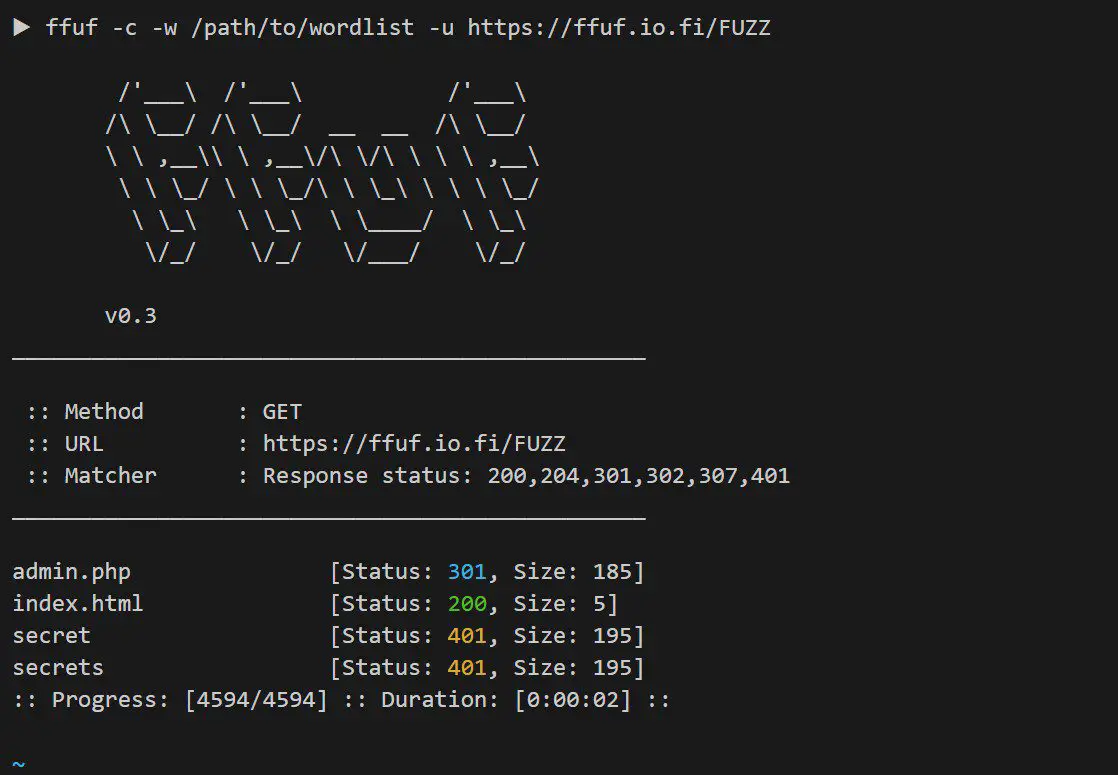
ffuf – Fuzz Faster U Fool
A fast web fuzzer written in Go.
Heavily inspired by the great projects gobuster and wfuzz.
Features
- Fast!
- Allows fuzzing of HTTP header values, POST data, and different parts of URL, including GET parameter names and values
- Silent mode (-s) for clean output that’s easy to use in pipes to other processes.
- Modularized architecture that allows integration with existing toolchains with reasonable effort
- Easy-to-add filters and matchers (they are interoperable)
Changelog v2.1
- 7a2756a Prepare for v2.1.0 release (#724)
- 36124a1 Default to match 2XX (#723)
- e3e4e62 Report if request times out while time matcher / filter is active (#722)
- e80fdc4 [FEATURE] Extensible Auto-calibration strategies (#694)
- a7dea16 allow unused wordlist in config file (#652)
- 8453335 Don’t write a finishing newline in silent mode (#677)
- 02e6a73 Add -raw cli flag (#721)
- 3fdb4e2 Automatic brotli and deflate decompression (#720)
- 6731988 Fix #718 (#719)
- 9f2163a fix csv output file format (#683)
- 6f29907 Fixed Error for HTML Output (#714)
- 96fef62 Fix Issue696 — Divide by 0 Error when setting rate to 0 manually (#700)
- 301968c Add cert authentication to crawl (#713)
- ca2224c Pencode (#717)
- 5fd821c Fix md output format (#672)
- e979f72 bump golang.org/x/net from 0.5.0 to 0.7.0 (#650)
- b8705ef Add additional check for keywords when using sniper mode (#661)
- a3bd865 Support older versions of TLS regardless of Go defaults (#671)
- 627c871 [Fix] Fixed multiline output when using only one fuzz variable (issue #645) (#656)
- b2c1f94 Fix HTML output (#640)
Installation
- Download a prebuilt binary from releases page, unpack and run! or
- If you have Go compiler installed: go get github.com/ffuf/ffuf
Usage
To define the test case for ffuf, use the keyword FUZZ anywhere in the URL (-u), headers (-H), or POST data (-d).
Example
Typical directory discovery
By using the FUZZ keyword at the end of URL (-u):
ffuf -w /path/to/wordlist -u https://target/FUZZ
Virtual host discovery (without DNS records)
Assuming that the default virtualhost response size is 4242 bytes, we can filter out all the responses of that size (-fs 4242) while fuzzing the Host – header:
ffuf -w /path/to/vhost/wordlist -u https://target -H "Host: FUZZ" -fs 4242
GET parameter fuzzing
GET parameter name fuzzing is very similar to directory discovery and works by defining the FUZZ keyword as a part of the URL. This also assumes a response size of 4242 bytes for invalid GET parameter name.
ffuf -w /path/to/paramnames.txt -u https://target/script.php?FUZZ=test_value -fs 4242
If the parameter name is known, the values can be fuzzed in the same way. This example assumes a wrong parameter value returning HTTP response code 401.
ffuf -w /path/to/values.txt -u https://target/script.php?valid_name=FUZZ -fc 401
POST data fuzzing
This is a very straightforward operation, again by using the FUZZ keyword. This example is fuzzing only part of the POST request. We’re again filtering out the 401 responses.
Copyright (c) 2018 Joona Hoikkala
Source: https://github.com/ffuf/

